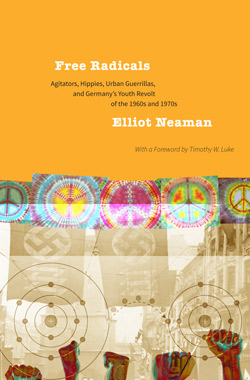Elliot Neaman’s Free Radicals: Agitators, Hippies, Urban Guerrillas, and Germany’s Youth Revolt of the 1960s and 1970s is now available for purchase in our online store. Save 20% on the list price by using the coupon code BOOKS20 during the checkout process. Also available in ebook format at Amazon.com (Kindle) and Barnes & Noble (NOOK).
 “There were actually at least two countercultures in 1968. The street mutineers dreamed of a political revolution, which was acted out as theater, using old scripts. In the second, politics became personal; emancipation came in the form of consumer choices. The first was collectivist and failed, the second was libertarian, individualistic, futuristic, and carried the day. In the United States Stewart Brand, the visionary who founded The Whole Earth Catalog in 1968, pithily described the difference as between ‘Berkeley and Stanford’: ‘Around Berkeley, it was Free Speech Movement, “power to the people.” . . .’ In Germany this kind of technology-as-revolution mindset was much more difficult to launch, given the entrenched romantic aversion to technology in the counterculture. Heidegger’s preference for techné (craftsmanship) over technology and the general aversion to industrial capitalism persisted well after 1968. The German street revolutionaries were right that the proletariat was about to be freed of its factory chains, but few anticipated the replacement of oily machines by computers, robots, cybernetics, and virtual reality. The contrast between Berkeley and Stanford found its rough parallel in Germany with the intellectual competition between Berlin and Frankfurt. The Frankfurters considered the Berliners not theoretical enough, and the Berliners thought the Frankfurters were not radical enough. But they were both limited by the horizon of Marxism, beyond which they could not comprehend other models.”
“There were actually at least two countercultures in 1968. The street mutineers dreamed of a political revolution, which was acted out as theater, using old scripts. In the second, politics became personal; emancipation came in the form of consumer choices. The first was collectivist and failed, the second was libertarian, individualistic, futuristic, and carried the day. In the United States Stewart Brand, the visionary who founded The Whole Earth Catalog in 1968, pithily described the difference as between ‘Berkeley and Stanford’: ‘Around Berkeley, it was Free Speech Movement, “power to the people.” . . .’ In Germany this kind of technology-as-revolution mindset was much more difficult to launch, given the entrenched romantic aversion to technology in the counterculture. Heidegger’s preference for techné (craftsmanship) over technology and the general aversion to industrial capitalism persisted well after 1968. The German street revolutionaries were right that the proletariat was about to be freed of its factory chains, but few anticipated the replacement of oily machines by computers, robots, cybernetics, and virtual reality. The contrast between Berkeley and Stanford found its rough parallel in Germany with the intellectual competition between Berlin and Frankfurt. The Frankfurters considered the Berliners not theoretical enough, and the Berliners thought the Frankfurters were not radical enough. But they were both limited by the horizon of Marxism, beyond which they could not comprehend other models.”
—Elliot Neaman, Free Radicals: Agitators, Hippies, Urban Guerrillas, and Germany’s Youth Revolt of the 1960s and 1970s
Praise for Elliot Neaman’s Free Radicals
“Free Radicals is a radical upending of what we thought we knew about Germany’s most famous generation.”
—Zachary Shore, Associate Professor of History, Naval Postgraduate School
“Free Radicals combines vast reading in memoirs, recent German-language research, and discoveries from the archives of government surveillance agencies, East and West, to cast a new and sober light on this mythicized period of German history.”
—Jerry Z. Muller, Professor of History, The Catholic University of America
“I wholeheartedly recommend the book—it captures the radical spirit of the time and is a must read for anyone that wants to get the complete picture of the Western world’s most unique entertaining revolutionary movement.”
—Michael Werz, Senior Fellow, Center for American Progress



